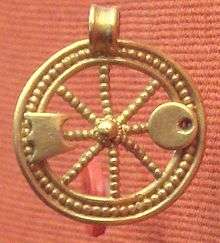Bricta
In Gallo-Roman religion, Bricta or Brixta was a Gaulish goddess who was a consort of Luxovius, god of the waters of Luxeuil-les-Bains (in antiquity, Luxovium). Nicholson (1999) has suggested however that if "Bricta is a title incorporating Bríg, it may actually be a title assigned to Sirona rather than a separate goddess".
Inscriptions
Bricta is recorded in the following inscriptions from Luxeuil-les-Bains :
- [Lus]soio / et Brictae / Divixti/us Cons/tans / v(otum) s(olvit) <l=T>(ibens) m(erito)
- "To Lusso(v)ios and Bricta, Divixtius Constans freely and deservedly fulfilled his vow." (CIL 13, 05425)
- Luxovio / et Brixtae / G(aius) Iul(ius) Fir/manus / v(otum) s(olvit) l(ibens) m(erito)
- "To Luxovios and Brixta, Gaius Julius Firmans freely and deservedly fulfilled his vow."
(AE 1951, 00231; CIL 13, 05426)
Etymology
This Gaulish theonym is derived from the word brixtom or brixta meaning a curse. The word also appears on the inscription of Chamalières. (Delamarre pp. 76–77 with references and comparative etymology)
References
- Année Epigraphique; volume 1951.
- Corpus Inscriptionum Latinarum (CIL), volume 13, Tres Galliae.
- Delamarre, X. (2003). Dictionnaire de la Langue Gauloise. 2nd edition. Paris, Editions Errance. ISBN 2-87772-237-6
- Nicholson, Francine (1999) Brighid: What Do We Really Know?. Celtic Well, electronic version.
This article is issued from Wikipedia - version of the Saturday, August 29, 2015. The text is available under the Creative Commons Attribution/Share Alike but additional terms may apply for the media files.

